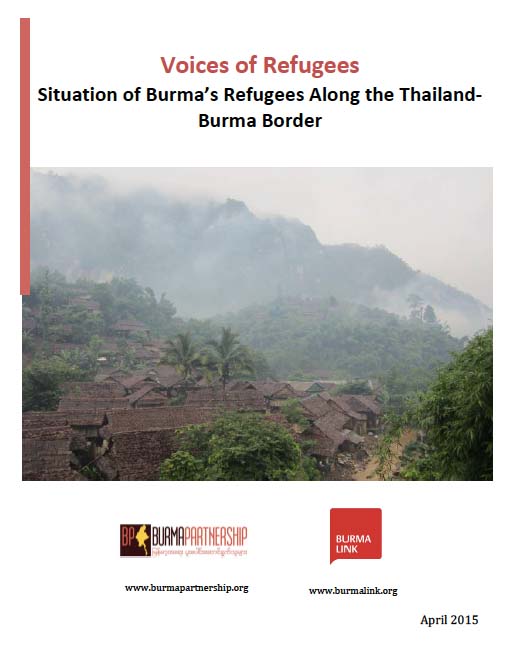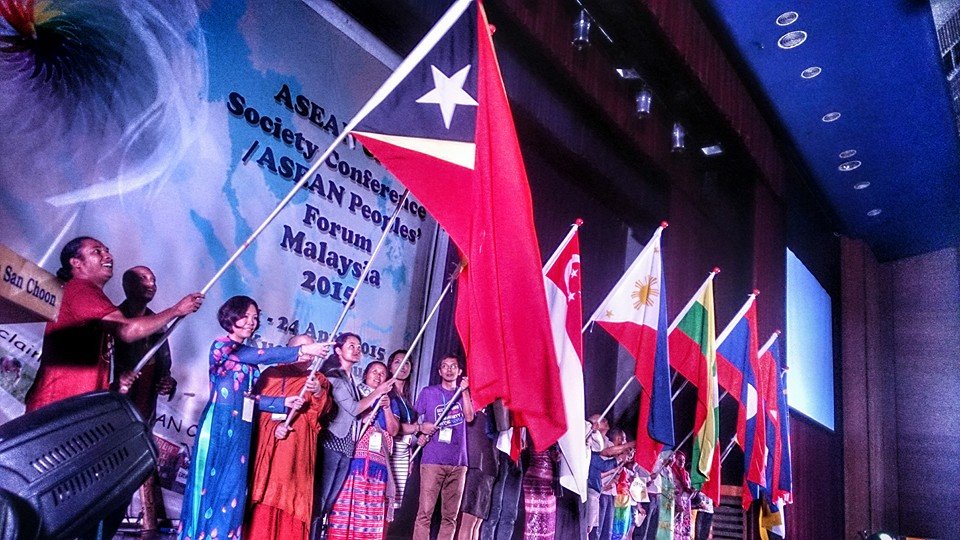Posts Tagged ‘Internally Displaced People’ (52 found)
An Open Letter to World Leaders on the Fourth Anniversary of The Resumption of War Calling Urgently for Humanitarian Aid for The Internally Displaced People of Northern Burma
On this fourth anniversary of the resumption of war against the Kachin people, the undersigned organisations call upon world leaders to strengthen their commitment to promoting peace and saving the lives, dignity and well-being of the Infernally […]
• • •Statement by KWAT on the 4th Anniversary of Renewal of war in Kachin Areas
The conflict situation in northern Burma has worsened during 2015. Despite the Burmese government’s claims to be promoting peace, they have continued their military build-up in Kachin and northern Shan State, launching large-scale offensives, including aerial bombings, which are devastating ethnic communities […]
• • •56 Solidarity Groups Worldwide Call for an Immediate Halt to All Military Offensives in Northern Burma/Myanmar and Unhindered Provision of Aid to Hundreds of Thousands of IDPs
(8 June 2015) On the fourth anniversary of the renewed war in Kachin State, 56 groups worldwide issued a statement in solidarity with the Kachin people by calling on the Burma Army to immediately halt all offensives in Kachin and northern Shan States and for the Burma/Myanmar Government to allow humanitarian agencies immediate and unhindered access to all internally displaced persons (IDPs) affected by the ongoing conflict […]
• • •ASEAN, International Community Must Prioritise Rohingya Women and Children in Crisis
The Women Peace Network – Arakan (WPN-A) urgently calls upon the international community, including ASEAN governments, to act immediately to save and protect the Rohingya women and children who are currently trapped at sea […]
• • •“Villagers Being Deliberately Starved, Regularly Beaten, Raped Or Murdered”; Situation Report on Western Burma; January – April 2015
“The border areas of Burma, Bangladesh and India are some of the most isolated in the world and the people are extremely poor because of communication and security problems, lack of education, ignorance of the situation amongst the international community and a lack of resources – the average wage is only two US Dollar per day for hard labor […]
• • •International NGOs Urge Ban Ki-moon To Negotiate Aid Access To Rakhine State, Myanmar (Burma)
Thirty seven international humanitarian aid and advocacy organisations have written today to the United Nations Secretary-General, urging him to give his “personal attention” to the humanitarian crisis in Rakhine State, Myanmar (Burma) and to take “a personal lead” in negotiating for humanitarian access to all areas of Rakhine State […]
• • •Killing, Beheading and Disappearance of Villagers Instill Fear of Return Among Kokang Refugees
According to recent interviews by SHRF, Kokang refugees sheltering in China remain fearful of return, due to killing, beheading and disappearance of villagers caught returning home […]
• • •Briefing Paper: Voices of Refugees – Situation of Burma’s Refugees Along the Thailand-Burma Border
(27 April 2015) Today, Burma Link and Burma Partnership launches a joint briefing paper, Voices of Refugees – Situation of Burma’s Refugees Along the Thailand-Burma Border, online. The briefing paper highlights how the voices of refugees continue to be neglected in Burma’s reform process […]
• • •Voices of Refugees – Situation of Burma’s Refugees Along the Thailand-Burma Border
 The joint briefing paper by Burma Link and Burma Partnership, Voices of Refugees – Situation of Burma’s Refugees Along the Thailand-Burma Border, which was published online on 27 April 2015, highlights how the voices of refugees continue to be neglected in Burma’s reform process.
The joint briefing paper by Burma Link and Burma Partnership, Voices of Refugees – Situation of Burma’s Refugees Along the Thailand-Burma Border, which was published online on 27 April 2015, highlights how the voices of refugees continue to be neglected in Burma’s reform process.
The briefing paper was initially launched and presented by Soe Aung at the most recently convened Association of Southeast Asian Nations (ASEAN) Civil Society Conference/ASEAN Peoples’ Forum 2015 in Malaysia, which took place between 22-24 April 2015 […]
• • •Hopes Shattered a Year on from Burma’s ASEAN Chairmanship
 The Association of Southeast Asian Nations (ASEAN) Civil Society Conference/ASEAN Peoples’ Forum 2015 (ACSC/APF) ended on 24 April 2015 in Kuala Lumpur, Malaysia, bringing the voices of the people of ASEAN together in its yearly three day event. It reminds us of the historic ACSC/APF 2014 that was held for the first time in Burma and the hopes raised and duly dashed since that forum in the past year. As civil society throughout the region strives for better promotion, protection and respect for human rights, a review of the human rights situation and democratic reforms in Burma over the past year represent dreams turning into nightmares.
The Association of Southeast Asian Nations (ASEAN) Civil Society Conference/ASEAN Peoples’ Forum 2015 (ACSC/APF) ended on 24 April 2015 in Kuala Lumpur, Malaysia, bringing the voices of the people of ASEAN together in its yearly three day event. It reminds us of the historic ACSC/APF 2014 that was held for the first time in Burma and the hopes raised and duly dashed since that forum in the past year. As civil society throughout the region strives for better promotion, protection and respect for human rights, a review of the human rights situation and democratic reforms in Burma over the past year represent dreams turning into nightmares.
Events at the ACSC/APF 2015 involving Burma included a theatre play by Burma’s students and youth depicting the events of Letpadan, where over 100 students and supporters were detained after a violent attack by police and hired thugs on the column of students marching from Mandalay to Rangoon. The play called for the government to release the 79 student protesters and their supporters that remain in jail. The ASEAN Youth Forum labelled this strive for education reform by Burma’s students as an “endless and painful struggle.” Events brought to mind previous student demonstrations and consequent crackdowns such as in 1974, 1988 and 1996, all of which were committed by overtly military regimes. It begs the question; what has changed? […]
• • •








 All posts
All posts